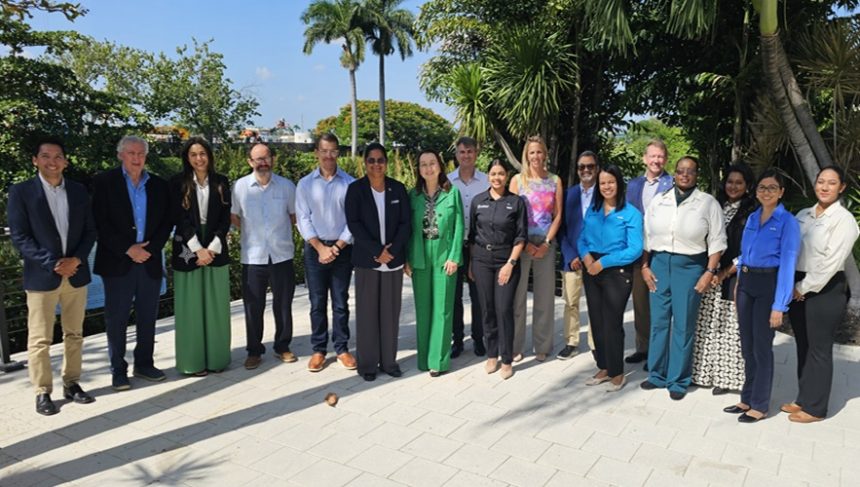Caribbean Biodiversity Fund Launches Groundbreaking Circular Economy Projects Across the Caribbean
The Caribbean Biodiversity Fund (CBF) officially launched the implementation phase of projects funded, through its Advancing Circular Economy (ACE) Facility during a three-day Grantee Award and Inception Workshop, held from August 25–27, 2025 in Miami.
The CBF’s Nature-Based Economies (NbE) Program was developed to support pollution reduction efforts in the Caribbean. The ACE Facility, a key initiative under the NbE Program, promotes marine litter management across the insular Caribbean. It works with public and private sector partners, as well as regional stakeholders, to fund practical projects that apply circular economy principles to minimize and prevent waste from entering the marine environment and, where possible, remove existing marine litter.
“The launch of these projects represents a pivotal moment for the Caribbean,” said Karen McDonald Gayle, CEO of the Caribbean Biodiversity Fund. “It’s about sustainably investing directly in tangible solutions that will not only reduce marine pollution but also foster resilient communities and create new economic opportunities across the region.”
Through investments in equipment and infrastructure, data and knowledge generation, policy support, and consumer education, the ACE Facility aims to catalyze sustainable change. It is funded by KfW Development Bank on behalf of the German Federal Ministry for Economic Cooperation and Development (BMZ).
This landmark workshop convened over seventy participants to celebrate the start of implementation for seven transformative projects aimed at reducing marine pollution and advancing circular economy solutions throughout the region. Participants included new ACE grantees, regional circular economy leaders, development partners, and the CBF team
Karolin Troubetzkoy, Chairperson of the Caribbean Biodiversity Fund said, “It is deeply gratifying to witness the ACE Facility advance from vision to implementation. These projects are not just about waste reduction – they represent a transformative shift toward resilient, regenerative economies across our Caribbean islands. Through innovative financing and bold collaboration, we are turning circular economy principles into real-world impact that safeguards our natural heritage and uplifts our communities.”
The event opened with remarks from the CBF Board of Directors Chair, and representatives of the ACE Facility Committee and KfW Development Bank.
“This workshop marks not just the start of project implementation, but the beginning of a collaborative movement to rethink waste, empower communities, and build regenerative economies in the Caribbean,” said Rachel Ramsey, Program Manager of the ACE Facility.
The first day featured grantee presentations in the open session, followed by closed sessions covering technical and financial reporting, procurement protocols, monitoring and evaluation, environmental and social safeguards, and storytelling for impact. Day two introduced grantees to Caribbean CONNECT and communication and coordination approaches at both program and project levels.
A field visit on the third day offered in-person participants a “Floating Classroom” experience on Biscayne Bay, facilitated by Miami Waterkeeper and Debris Free Oceans, followed by “Circular Conversations”— a dynamic reflection space encouraging collaboration, troubleshooting, and visioning for the grantee cohort.
Projects funded under the ACE Facility’s first Call for Proposals span a wide range of innovative approaches from reusable packaging systems and community-based recycling to education campaigns, circular business incubators, and pilot initiatives for extended producer responsibility (EPR). These initiatives aim to drive systemic change in waste management, create green jobs, and improve coastal and community resilience.
“These seven projects were selected for their innovative, robust approaches and strong potential to deliver measurable impact on our regional ecosystem,” said Derek Luk Pat, Chair of the ACE Facility Committee. “We are excited to see them effectively implemented and thereby contribute meaningfully to a cleaner, more circular Caribbean.”
The launch of the first call for proposals underscores the ACE Facility’s role as a catalytic financing mechanism helping Caribbean nations meet key global environmental targets under the UN Sustainable Development Goals (SDGs), the SAMOA Pathway, and the developing International Legally Binding Instrument (ILBI) on plastic pollution.
To learn more about the ACE Facility and its grantees, visit: caribbeanbiodiversityfund.org and please stay tuned for more information on the upcoming Call for Proposals 2 in October 2025.



